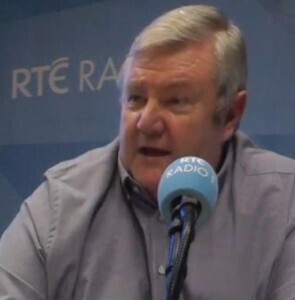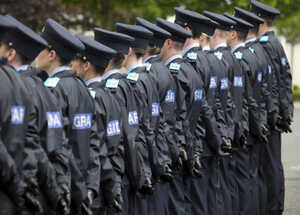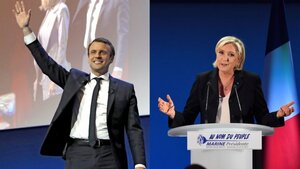From top: Leo Varadkar (right) and Micheál Martin during the Prime Time General Election 2020 leaders’ debate on RTÉ One on January 4; Derek Mooney
When Keith Waterhouse wrote his play about the dissolute wit, columnist and sports journalist, Jeffrey Bernard, he decided to entitle it: “Jeffrey Bernard is unwell”.
The name came from message editors of the Spectator would insert in the blank space where Bernard’s “Low Life” column should have appeared… except he was too hungover or pissed to write one.
It is not the only placeholder they used. The other one read: Jeffrey’s column does not appear this week as it remarkably resembles the one he wrote last week.
Broadsheet’s editors might have been justified in posting that message here if I hadn’t decided at the last minute to do a partial re-write of today’s column.
After three weeks of writing about the necessarily slow, but often strategically ill advised, process of government formation, there is nothing new I can add this week to either address or reduce the concerns I raised here last week, the week before and the week before that.
Nothing I have seen or heard from either Fianna Fáil or Fine Gael over the past seven days suggests that they plan to amend the barely one-dimensional strategies they have each adopted since the election.
Not that nothing has happened. Last Thursday the Fianna Fáil leader went on Sean O’Rourke’s RTE Radio One programme. To his credit, Martin was direct and open in setting out his stall. Bluntly so.
He didn’t dance around it. He made it very clear that his preferred option is full coalition between Fianna Fáil and Fine Gael with Green party and possibly independent TD participation. He left the door open to the idea of a rotisserie, sorry, a rotating Taoiseach, too.
Was this attempt to prepare or soften up the Fianna Fáil base? If so, it hasn’t worked. For many Fianna Fáil activists hearing the leader of their party talk candidly about putting Fine Gael ministers back in office after a campaign that was supposed to be about replacing them was a step too far.
The party faithful had been just about willing to countenance some sort of Fine Gael Confidence and Supply arrangement, a reverse of the 2016 scenario, but here they were listening to a Fianna Fáil leader not just discounting this as a possibility, but saying that serving alongside Fine Gael ministers was his first choice.
No wonder last Thursday afternoon’s Fianna Fáil parliamentary party meeting was fraught.
But this is no bad thing. While it may not mark a change in Fianna Fáil’s approach, it may be a signal that the parliamentary party is ready to insist on having greater oversight of the government formation process. One assumes that this will include a serious examination of what went wrong with Fianna Fáil’s #GE2020 campaign.
One other positive is the fact that Fianna Fáil’s Jim O’Callaghan TD and John Lahart TD were both prepared to entertain the idea of there being a possible national unity government from across the Dáil. I mentioned this possibility here last week in the context of a note I had written the day after the election count.
There are a variety of ways such a unity government could be structured, including using the d’Hondt system of allocating ministerial posts amongst those parties and groups (of independents and smaller parties) who wish to participate in government.
While the d’Hondt method could be a useful way of ensuring a fair distribution of departments and ministers, it would not sort out the thorny issue of who becomes Taoiseach – (and it’s worth noting that there are very few examples of the rotating Prime Minister model working in practice, apart from the Israel’s national unity government of the late 1980s which resulted in a dirty trick political scandal) or its programme for government.
In addition to seriously tackling the problems in housing and health and addressing climate action, any programme for a national unity government, be it for a year or two years would also have to address the developing Coronavirus/Covid-19 public health crisis.
I know from my time dealing with the Office of Emergency Planning that there is a robust system of emergency planning for a range of possible emergency scenarios including major accidents, nuclear incidents, weather emergencies and pandemics.
I have no doubt that the government is seeking and following the best expert advice it can get, nationally and internationally, and this will inform the discussions at the cabinet sub-committee on Coronavirus this morning. But ministers here must also watch what other governments across the EU are doing and heed the lessons of what went wrong in Italy and China.
France and Germany are set to ban gatherings of more than 1,000 people as part of their efforts to slow or impede the spread of the infection. We should too, indeed we should have already done so.
That means cancelling the St Patrick’s Day festivities across the country. This will cost tens of millions, just as it did back in 2001 when the arrival of Foot and Mouth caused parades and festivities to be cancelled (well technically postponed until May that year), but it is the responsible thing to do.
Delaying the cancellation announcement, even if only until today, is just increasing pressure on individual event organisers, such as those in Killarney town who now say they are proceeding.
Last week the Taoiseach urged people not to act unilaterally in cancelling events saying that the government was closely monitoring the situation.
He needs to act now – and that means erring heavily on the side of caution and risk avoidance when it comes to the St Patrick’s Day events. Cancelling them now could just be the occasion when his not taking a risk pays off.
Derek Mooney is a communications and public affairs consultant. He previously served as a Ministerial Adviser to the Fianna Fáil-led government 2004 – 2010. His column appears here every Monday.Follow Derek on Twitter: @dsmooney








WHY ARE FLIGHTS STILL COMING IN FROM NORTHERN ITALY!? FFS!
it’s monday treasa. stop shouting.
Irish politics is so horribly and pathetically jaded at this point.
Isn’t it bizarre that, in the context of the recent election, and in the face of everything that’s going on, 2 political dinosaurs are bickering and squabbling about, trying to get their muddy snouts back in the trough?
2 right wing parties, with their pretend opposition, going at it like red-faced committee members of a failing golf club.
“there is a robust system of emergency planning for a range of possible emergency scenarios” – Obviously this doesn’t apply to housing or healthcare.
um. because those 2 right wing parties achieved just short of 50% of the votes? If you include right-wing independents – the left-wing are a minority.
Um. How much is that quota down from 20 years ago Cian?
Dinosaurs indeed..
A huge amount. But the simple fact is that the Irish voter is still right wing.
If that is your take, than your clearly living in dream land.
Leo and the gang are not inclined to rush into taking measures that might interfere with the profits of big business. Gotta keep the recovery going you know.
Yet if people were really buying into this Recovery and fully participating in this booming economy
that has us pitched near the top of this World Rankings yoke that Cian and RobG are hawking and bragging about
You’d think they’d vote for the FFFG Axis
…and yet a few hours later…
Keep yizzer fingers off the triggers lads.